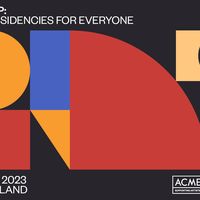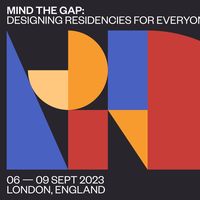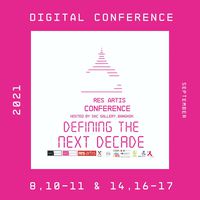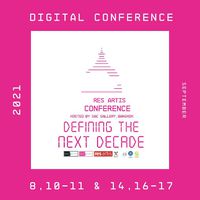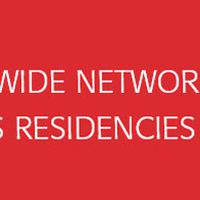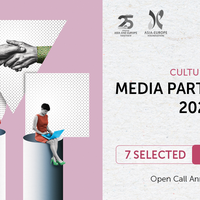Res Artis Conference "Mind the Gap: Designing residencies for everyone" | Interview with Josephine Mead and Lea O' Loughlin
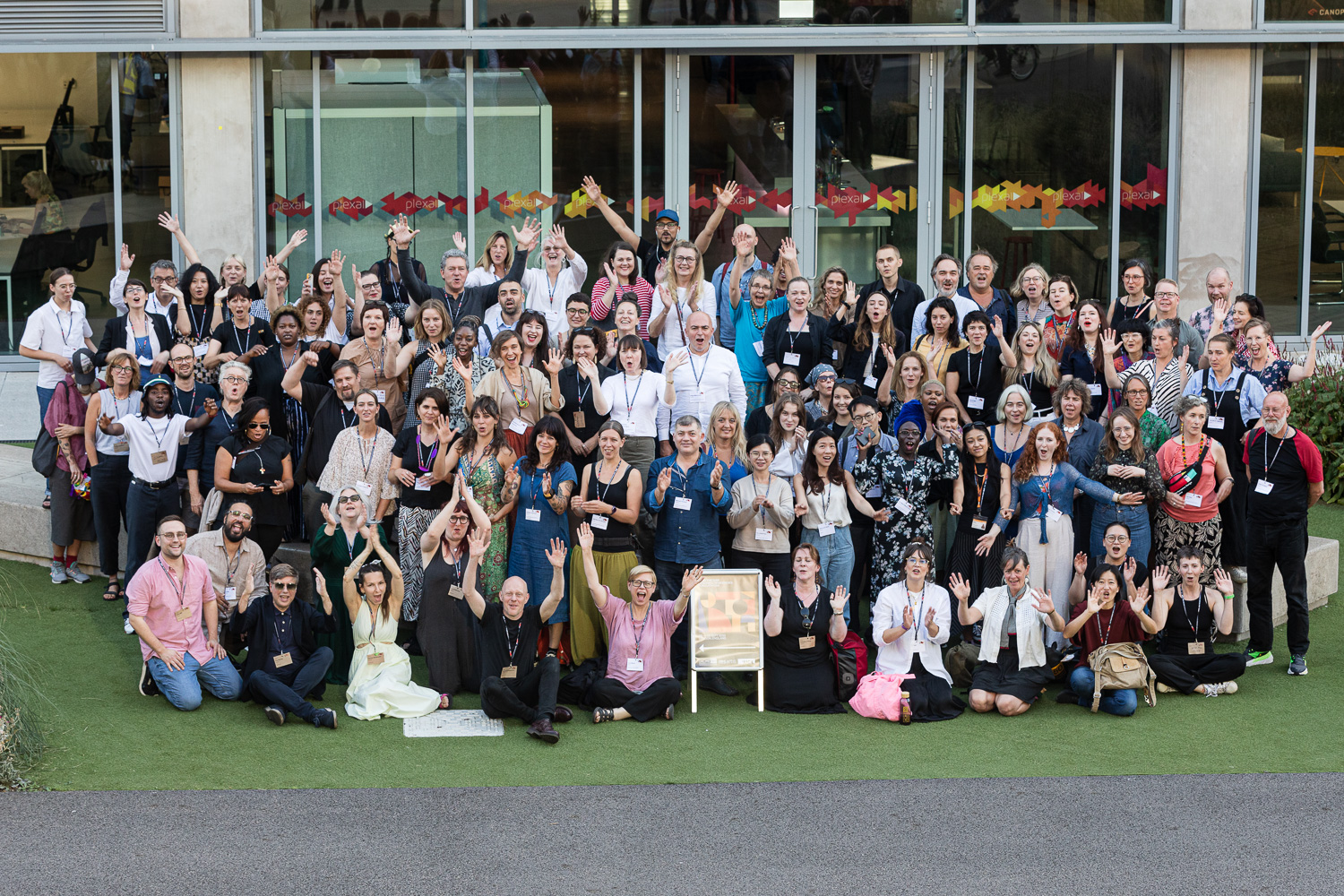
As part of culture360's Media Partnership with Acme for this year's ResArtis Conference, we speak to Communication and Programme Coordinator at ResArtis, Josephine Mead and Co-Director of Acme, Lea O'Loughlin, to find out how these two organisations came together to consider and improve access needs to develop more inclusive and diverse programmes during "Mind the Gap: Designing residencies for everyone".
1. How would you best describe the goals and mission of Res Artis? Have they changed or developed since Res Artis was first established 30 years ago? If so, how?
Josephine Mead: Res Artis is a world-wide network of arts residencies. We work to ensure the global arts residency field remains professional, diverse, sustainable and transparent. Our goals to support arts residencies to provide safe and meaningful experiences for artists have been consistent throughout our 30 years of operating. In recent years, we have developed new goals to support digital possibility within the arts residency field (following the pandemic); to increase representation of residencies in under-represented areas, such as Asia, Africa, The Middle East, Oceania and South America; and to increase awareness of accessibility needs within the global field.
2. This year’s Res Artis conference titled ‘Mind the Gap: Designing Residencies for Everyone’, delves into diversity, accessibility and inclusion. What was the inspiration behind the chosen theme? What does the chosen theme reveal about the current state of the arts residency field?
Josephine: There are many conversations within the global arts residency field that currently call upon the need for inclusion, diversity and accessibility. Res Artis is currently working to bring these conversations to the fore. Visibility of residencies on a global scale is skewed towards prioritising European and North American ventures. We are working to increase representation of residency programs in other areas of the world.
Likewise, artists from certain areas have greater challenges when attempting to undertake international residency programmes – such as funding or visa issues. Many arts residency programmes are not accessible. We have been working to produce resources to guide our members to create programmes that are as accessible as possible.
This year’s conference was able to highlight some of these issues. Speakers were able to comment on these issues through sharing their own lived experiences and through providing ideas and resources to create a global residency sector that is diverse, inclusive and accessible. Our conference host, Acme, worked hard to ensure their programming responds to these needs. Therefore the theme of the conference was a natural choice for them.
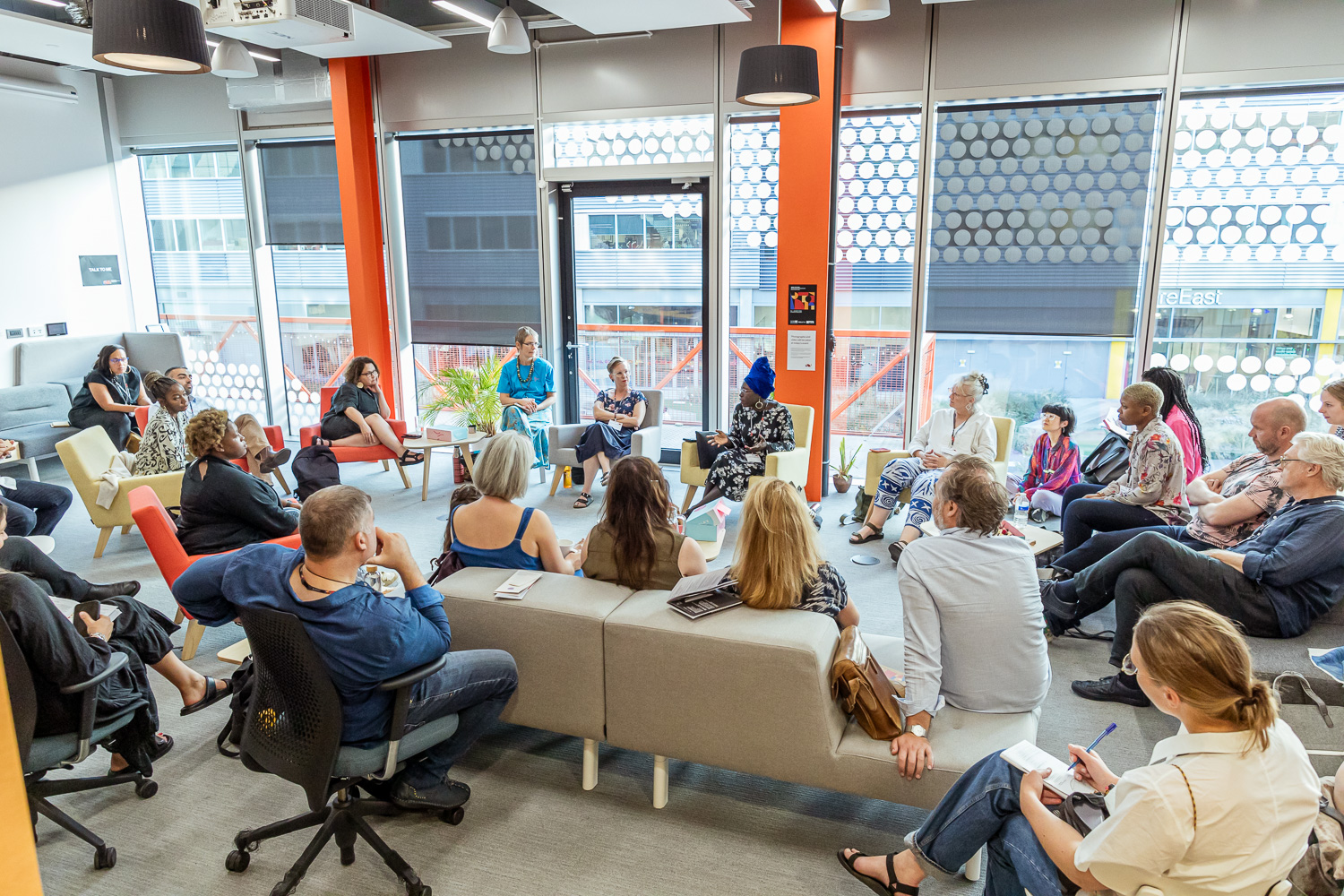
1. Mind the Gap: Designing residencies for everyone, 6-9 September 2023, London © Photo: Hydar Dewachi, Acme Archive
3. How did this year’s conference go? Did it meet your expectations in terms of participation and engagement?
Josephine: We couldn’t be happier with how the 2023 Res Artis Conference, Mind the Gap: designing residencies for everyone went. This was a product of an unwavering dedication to the conference themes by all of Acme’s staff and UCL. We were joined by 200+ attendees from all over the world. Attendees comprised of artists, residency providers, Res Artis members and cultural institutions / arts organisation professionals. To be within such a large group of experts made for critical and generative conversation and exchange. The global breadth of attendees allowed us to gain deep insights into diverse global issues. We have concluded the conference with strong ideas for how to move Res Artis forward, ensuring that we can support our members to continue to create programmes that are inclusive, accessible, sustainable and professional.
4. From the various discussions featured at the conference, what are the 3 or 5 key themes/ideas that were highlighted? How does Res Artis plan on continuing these discussions or exploring any of these ideas deeper?
Josephine:
Access: There is a global need for arts residency programmes that take into account access needs. The pandemic brought to the fore a lot of these issues and the uptake of digital residencies that the pandemic created resulted in a lot of opportunities for artists to partake in international exchange (virtually) in ways that would have not been possible – physically, financially or logistically, through in-person exchange. Digital residencies can allow for opportunity despite physical access needs. Access-needs can vary greatly as a result of social economic status, geographic location and cultural demographics. More awareness is needed throughout the sector to understand the nuances of access needs. Res Artis is facilitating meetings with access consultants to gain a better insight into practical ways that our members can embed accessibility within their programmes. We have been working to produce access-related resources for our members and will continue to do so throughout 2024. We also hope to profile artist stories from artists with access needs, across our various communication channels.
Inclusion: The conference brought to the fore the need for residencies to act as inclusive spaces, that welcome artists regardless of race, gender, sexual-preference, or socio-economic circumstance. Arts residencies create space for cross-cultural exchange. To assist our members in creating inclusive programming, we are working to produce and share resources that disseminate knowledge regarding cultural differences, access-needs, visa-related obstacles, advice for working with artists at risk, advice on supporting artist-parents, and advice on supporting LGBTQIA+ artists. We are also working to ensure diverse representation of artists from all circumstances throughout our communication channels. We believe that representation is key in ensuring a global arts residency sector that is truly inclusive.
Sustainability: The need for eco-sustainable practices in the arts residency field has been a major topic of concern for our members over the past few years. In a field that is dependent on international travel, arts residencies can often be seen as non-environmentally sustainable experiences. There are many small steps Res Artis members can take to ensure that their programmes are as sustainable as possible. Res Artis is currently committed to SHIFT – an initiative that has brought 15 like-minded cultural organisations together to work towards independent eco-certification. Our findings from the initiative will be shared with our members, in hopes they can better their programmes.
Representation: We have 650+ members in over 80 countries. The majority of our membership base is in Europe and North America – very much due in part to our history of being established in Europe. We are committed to raising representation of residency programmes in other areas and are concentrating our efforts to increase our members throughout Asia, Oceania, Africa, South America and the Middle East.
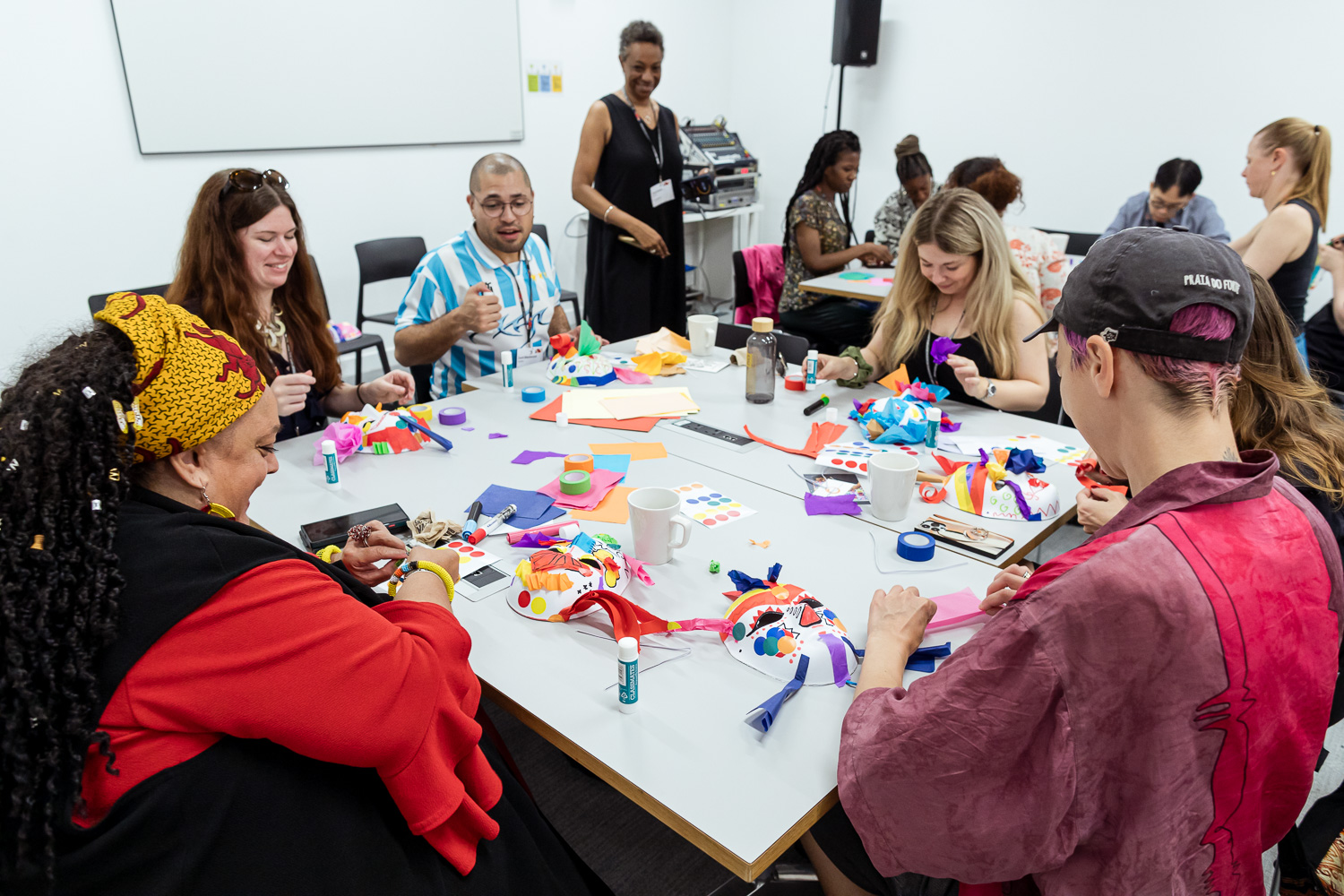
2. Mind the Gap: Designing residencies for everyone, 6-9 September 2023, London © Photo: Hydar Dewachi, Acme Archive
The following questions were answered by Lea O' Loughlin, co-director of Acme, the host of this year's ResArtis conference.
5. As an organisation based in London, could you share a little more on what London’s arts residency scene is like nowadays? How important is the local context in the planning of the conference?
Lea O'Loughlin: The UK is the second largest art market in the world, with London accounting for more than 40% of creative sector employment. A large diverse population and an historic combination of private philanthropy and governmental support has resulted in a rich cultural complexity, where a myriad of subcultures thrive and continuously reinvigorate the capital.
Whilst it was impossible to capture all of this over a four day conference, highlighting different aspects and the diversity of our local London context, and the challenge of artists lived experiences within that, was incredibly important.
Due in part to its vibrancy, complexity and the difficulties related to living and working in London as an artist long-term, London’s residency scene, where artists are supported for shorter periods of time to understand and navigate some of these challenges, is thriving. Increasingly many artists professional development and support activities are evolving to incorporate residencies or seek to replicate elements and benefits of the artist residency experience, which in itself are resulting in new thinking and hybrid models for the sector.
6. As the host organisation of this year’s conference, can you share with us how you incorporated the theme of diversity, access and inclusion when it came to logistics of the conference?
Lea: Every aspect of Mind the Gap: Designing residencies for everyone was committed to its overarching themes of diversity, case and inclusion. We instigated an open call process for conference speakers, the first time that a Res Artis conference had ever been programmed in this way. During selection, we prioritised applications from marginalised communities, artists and unwaged individuals needing financial assistance to attend the conference, and from conference funds we paid a speaker fee (in line with Artists Union England rates of pay), flights and accommodation costs. We asked waged speakers representing established organisations to consider donating or part donating their expenses in order to support further marginalised speakers, and were able to fund an additional nine speakers in this way. Additional financial allocations were made for transport adaptation, and carer and support personnel.
All of our venues were physically accessible, and accessibility needs were addressed individually in response to registrant information. Every person who raised an accessibility need was individually contacted by Acme to discuss specific requirements and adaptations were made in relation to: multi-language translation (software enabled simultaneous translation into 31 languages), British Sign Language (in person translators were available for the entirety of the conference), separate quiet spaces, prayer space and closed circuit viewing in separate rooms for those who were not comfortable sitting in a large scale auditorium for long periods of time. Break times were designed to enable appropriate rest.
As the conference encompassed a number of sensitive topics, we also had a risk and action plan in place in case differing perspectives resulted in hostile environments. Fortunately, all attendees contributed in a respectful and nuanced manner, and this did not need to be actioned.
The conference offered in person tickets across the 4 days, as well as one day in person tickets for Friday and an online digital offer. The livestream of the conference will be available to all attendees and the wider public for their own professional reference.
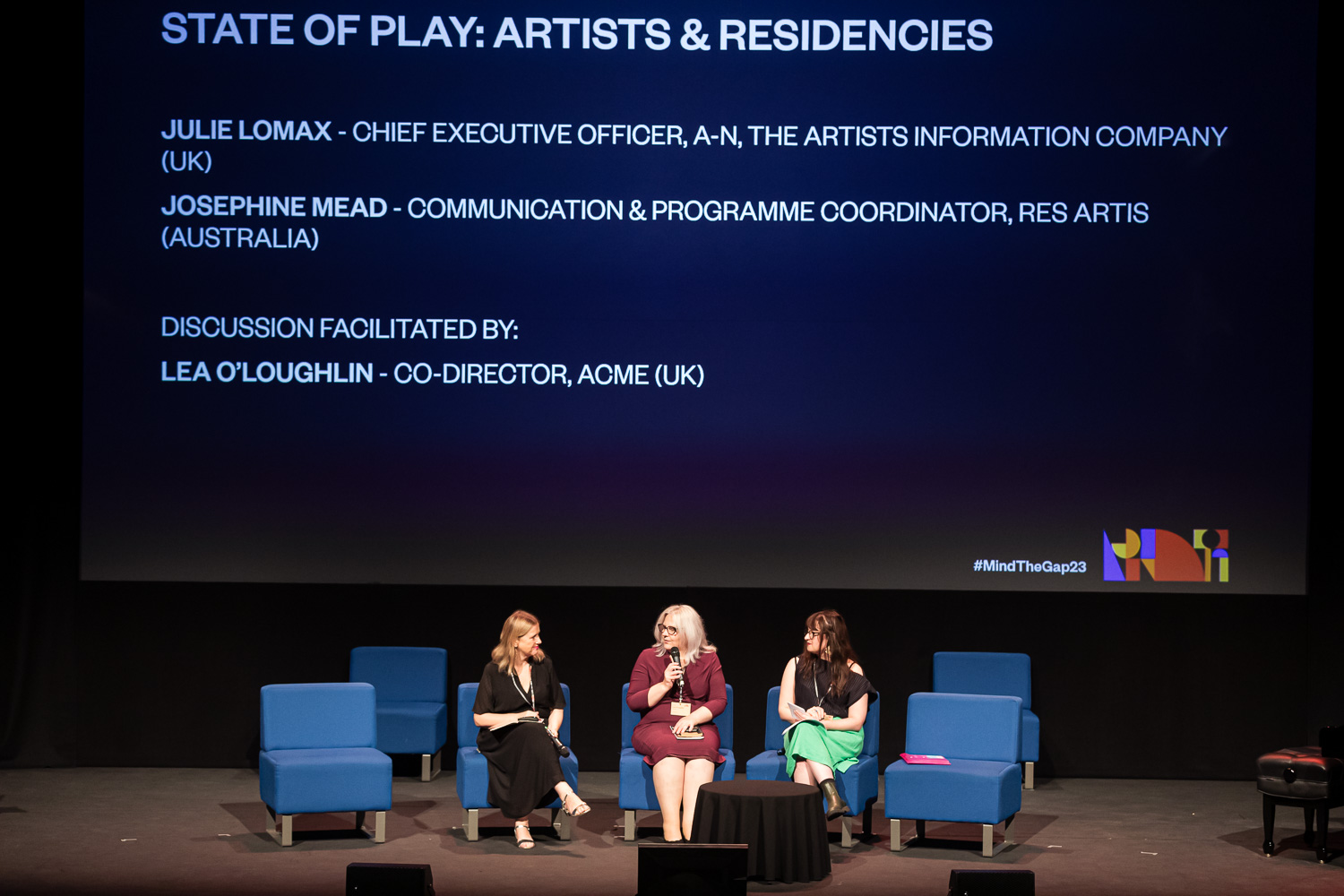
3. Mind the Gap: Designing residencies for everyone, 6-9 September 2023, London © Photo: Hydar Dewachi, Acme Archive
7. Looking ahead, what do you see in the future of the arts residency field, and how would you like for the field to grow and evolve?
Lea & Josephine: We believe that the global arts residency field is opening up to become more inclusive and accessible. These positive changes are very much a product of the turbulence of the last few years, from issues brought to the fore by the global pandemic and human rights initiatives, such as the Black Lives Matter movement.
We can foresee a future for arts residencies that allows more space for historically underrepresented artists, as well as an increase in digital exchange. There has been a big increase in arts residencies that are committed to ecological awareness, and we believe this will continue to increase in coming years.
8. Any advice or tips for aspiring creative professionals who are interested in establishing an arts residency?
- Listen to artists first. Ask artists what they need. Every artist you engage with will have different needs.
- Consider how accessible your programme is and set clear expectations with artists.
- Always have a residency agreement that is signed by you and the artist.
- Document your programme and share work created. Promotion is key when establishing a new residency programme.
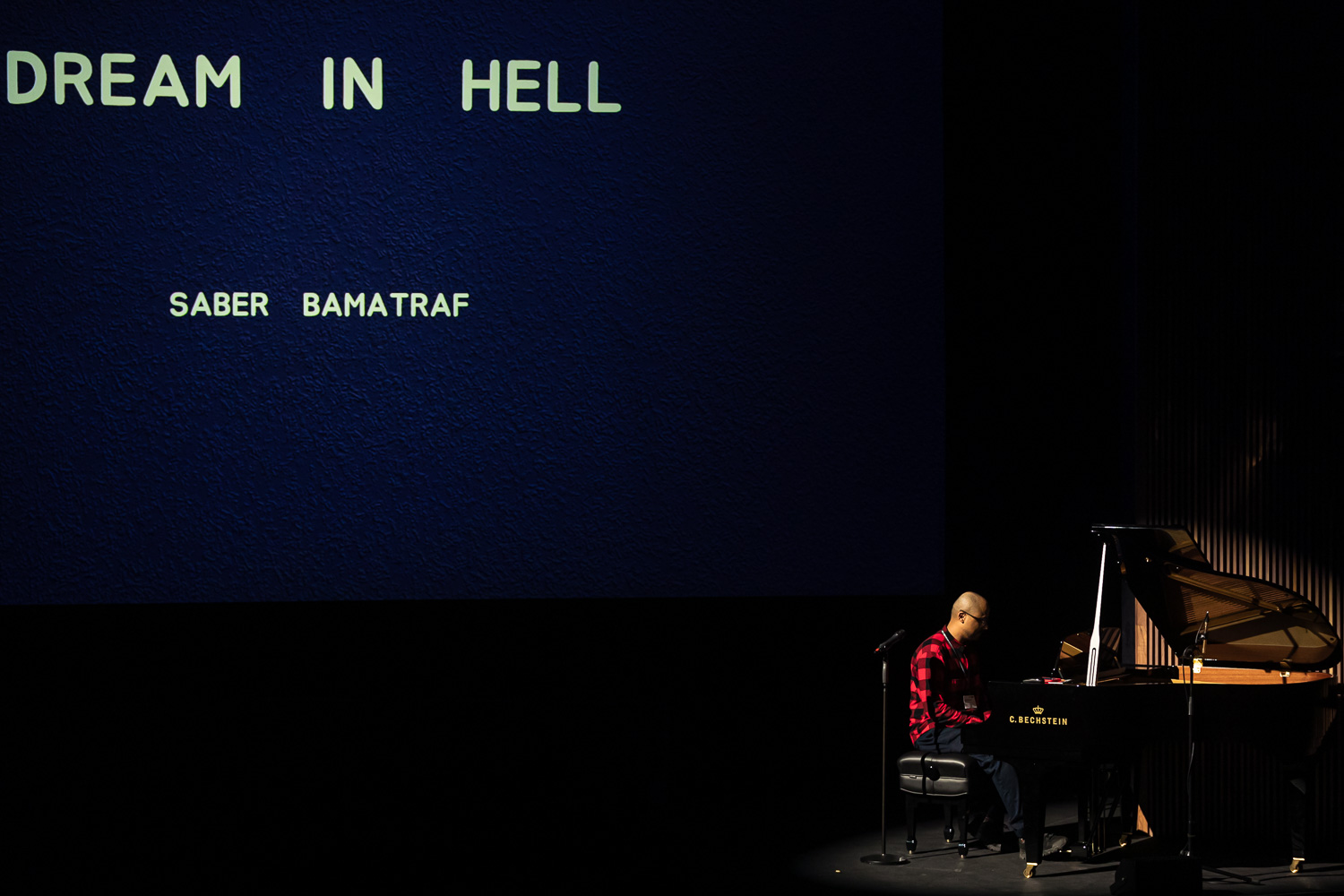
4. Mind the Gap: Designing residencies for everyone, 6-9 September 2023, London © Photo: Hydar Dewachi, Acme Archive
About the Interviewees
Josephine Mead
Based on Dja Dja Wurrung & Wurundjeri Country (Australia), Josephine Mead is the Communication &Programme Coordinator at Res Artis. She is a visual artist, writer and curator, interested in personal notions of support. She has exhibited and been published widely and has undertakenresidencies in regional Victoria (The Macfarlane Fund Residency), Mexico (Arquetopia FoundationResidency), Portugal (Córtex Frontal Residency), Turkey (Tasarim Bakkali TAB Residency) andGermany (ZK/U Residency at Zentrum für Kunst und Urbanistik). In 2020 Josephine co-foundedCo- Publishing.She was Chair of Artistic Directors for Blindside Gallery (2020-22) and a founding Artistic Director ofMILK Gallery (2022).
Lea O’Loughlin
Lea O’Loughlin is Co-Director of Acme, the largest provider of permanent affordable artist studios in England. Acme works collaboratively with partners to deliver affordable and secure artist studio provision, and to develop pioneering residencies and awards programmes that support artists in need at all stages of their careers. Lea is a previous board member of Res Artis, serving as President of the board from 2018-22. A previous member of the British Council’s UK Arts Hubs Advisory Board she currently sits on the steering group for CVAN London and is a member of On the Move, Women on Boards and the Association of Women in the Arts.
Similar content
from - to
06 Sep 2023 - 09 Sep 2023
deadline
06 Mar 2023
from - to
08 Sep 2021 - 17 Sep 2021
from - to
08 Sep 2021 - 17 Sep 2021
posted on
08 May 2020
posted on
09 Mar 2023

